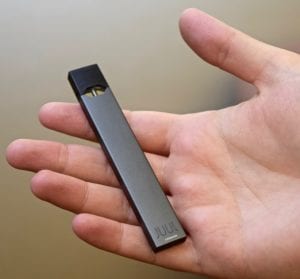Who is a member?
Our members are the local governments of Massachusetts and their elected and appointed leadership.

A Juul brand e-cigarette
On Sept. 24, Gov. Charlie Baker ordered a four-month ban on all in-store and online sales of vaping products in Massachusetts, citing a rash of illnesses and deaths believed to be caused by e-cigarettes and related products.
The ban – the first of its kind in the country – applies immediately to all flavored and unflavored vaping products and devices, including tobacco and both medical and non-medical marijuana.
Baker said medical experts need time to gather more information about the connection between vaping and life-threatening illnesses.
“We also need to better understand the inherent dangers of vaping both nicotine and marijuana,” he said. “With all this information we can then develop a set of targeted measures and response.”
As of Sept. 18, the U.S. Centers for Disease Control and Prevention had reported eight deaths and more than 530 medical cases involving lung infections and/or pneumonia that are believed to be caused by vaping products such as e-cigarettes.
While the use of e-cigarettes is a common factor among this group, public health officials are working to determine if other factors were involved. There’s speculation that a contributing factor could be that some consumers are adding THC (the psychoactive ingredient in marijuana) or CBD (cannabinoids, the non-psychoactive ingredient of marijuana and hemp) to vape solutions. Other possible factors include chemicals used in the process of producing a vapor from a liquid, such as propylene glycol or glycerine; a harmful change in chemical composition when a liquid flavor is aerosolized; or impure, homemade or discount vape solutions.
There is currently no federal oversight over product design, safety or solutions.
The CDC is recommending that users try to stop using vaping products until the investigation is conclusive. The Massachusetts Department of Public Health has sent an advisory to 25,000 health care providers statewide and now mandates that hospitals to report any “cases of significant, unexplained respiratory illness and a history of vaping” for at least the next 12 months.
The American Medical Association echoed the concerns of public health agencies and asked the U.S. Food and Drug Administration to ban the sale of e-cigarette flavors and to use its authority to enact stringent regulations over these products.
In response to the health crisis, the U.S. Department of Health and Human Services is exploring limits or a ban on the sale of flavored e-cigarettes. Tobacco control advocates, however, are concerned that a federal rule would be watered down through the political process, that the tobacco industry would seek state and local level pre-emption, and that a partial flavor ban that exempts mint or menthol would drive youths to use those flavors.
At the end of August, Juul, the best selling e-cigarette in the country and likely the most popular vaping brand used by underaged youths, sent a memo to retailers stating that it will penalize stores found to be selling Juuls to underaged purchasers. It is unclear if the company would take steps against Massachusetts retailers who have failed in-state and local compliance checks.
The memo notes that Juul seeks to limit the sales of nicotine pods per customer transaction, to address adult purchases of pods for a youth.
Massachusetts continues to see problems with retailers selling to youths, who in turn buy a number of Juul pods to resell to friends at school.
Massachusetts cities and towns have been strengthening local measures regarding the sale of vaping products and expanding school policies to include a prohibition on vaping by students. Four cities and towns limit vape sales to adult-only retail tobacco stores, and 165 cities and towns limit the sale of flavored vaping products (exempting mint, menthol and wintergreen) to adult-only retail tobacco stores. (Thirteen have included mint, menthol and wintergreen flavors in their sales restriction policy.)
A handful of municipalities have expressed an interest in permanently or temporarily banning the sale of all vape products until the CDC and FDA have concluded their investigation and take steps to correct the problem. The Coalition for Responsible Retailing, by a letter from the Fletcher Tilton law firm, has threatened one town with a lawsuit if it pursued this public health measure.